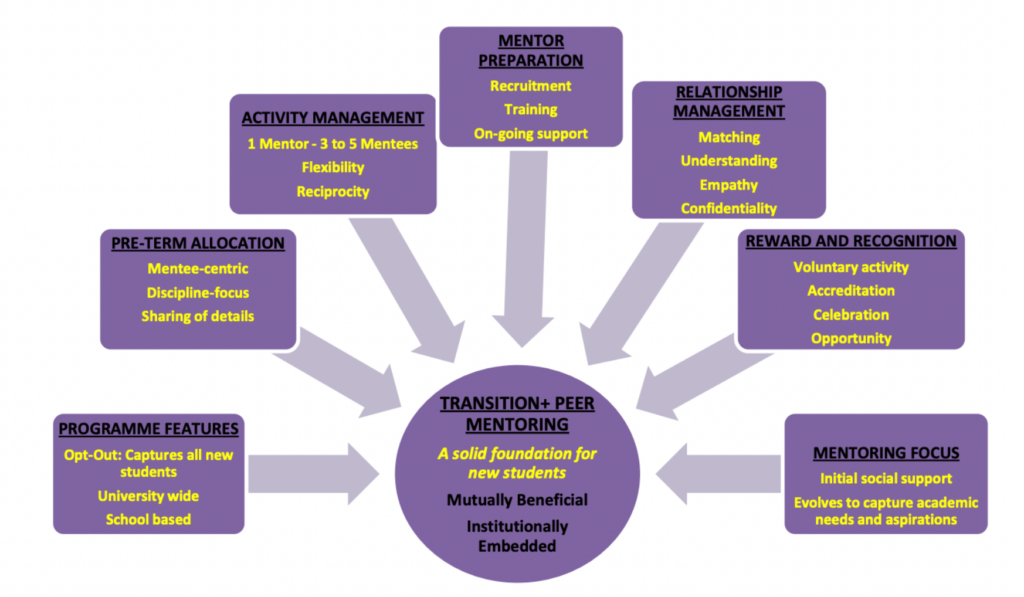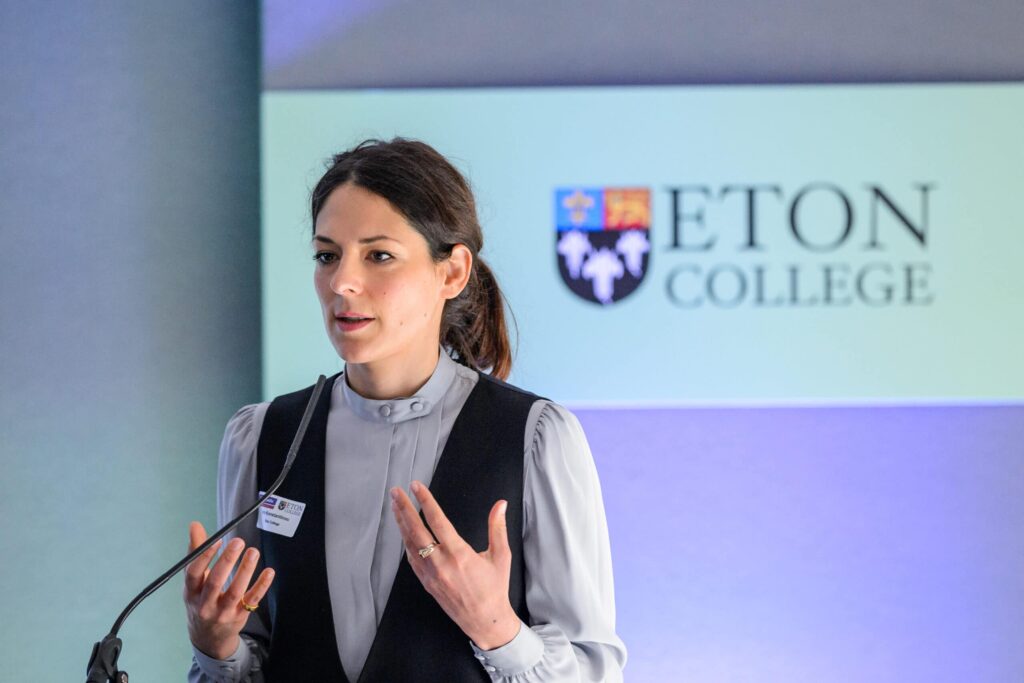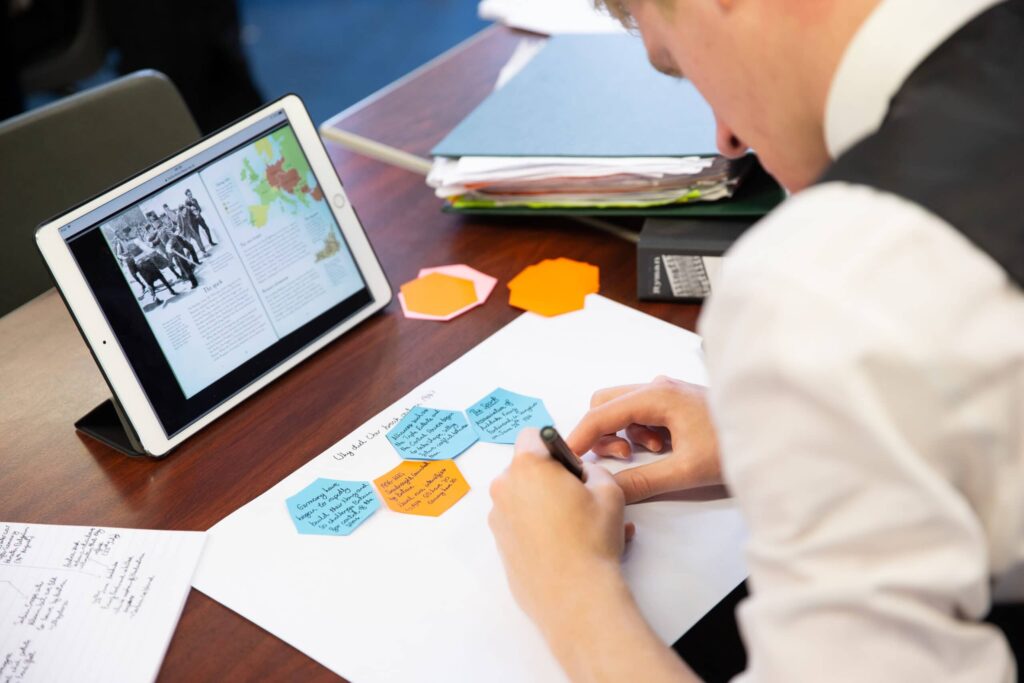As part of Eton’s partnership and outreach work, CIRL have produced a report summarising the research on student peer-mentoring and hope to run an event on this topic shortly. If you would like to be involved or find out more about this event, please contact CIRL. This blog post covers the main findings of the report and offers some suggestions as to how a peer-mentoring programme can be successfully implemented in schools. You can also read the full report, by clicking here.
What is mentoring?
Mentoring is where a ‘senior’ person or mentor provides information, advice, and emotional support to a ‘junior’ person or student over a period of time. This type of hierarchical mentoring relies on the two individuals coming from different social positions, for example teacher–student, adviser–student, or counsellor–student. Peer mentoring, on the other hand, matches mentors and mentees who are roughly equal in age and status (see Collier, 2017).[1]
Peer-mentoring programmes within schools have undergone a significant period of growth over the past decade and the majority of schools in the UK have a mentoring scheme in place. However, the way in which these schemes are implemented varies depending on the institution.
Evidence Base
The research on peer-mentoring thus far has predominantly focused on bullying and behaviour change, as well as the impact on academic attainment. However, there has been an increasing focus on specific outcomes such as attendance, transition and well-being.
For example, a study on emotional literacy with Year 7 students found that peer mentoring had a positive impact on emotional literacy competencies for those who had low-to-average levels at the beginning of the intervention (O’Hara, 2011); another study found that it had a positive impact on students’ self-confidence (Blegur et al, 2019); and one conducted in 2021 found that peer-mentoring helped students develop skills in communication, confidence, empathy for others, relationship building and improved self-awareness (Glazzard, et al., 2021).[2] Larson et al. (2020) found that an effective mentoring scheme improved the leadership skills of mentors and caused a surprising decrease in altruism (Larson et al., 2020).[3]
As you can see, the main benefits tend to revolve around the development of character skills such as leadership, confidence, and communication skills. Another key finding which emerges from a significant number of students is the positive impact peer-mentoring can have on helping to establish a more collaborative school culture, with mentors and mentees acquiring a sense of purpose, motivation, and sense of belonging in the school and community (San Antonio et al., 2020).[4]
Strategies
Studies find that the programmes which have a formalised structure and include rigorous training, those which use hierarchical peer mentoring (older with younger students), and those which ensure the matching of students is carefully thought through (to align their interests and experiences) tend to be the most successful. There are, however, a number of other strategies which can be used to make peer-mentoring programmes more effective.
• Mentors need to be selected based on their skills and these should align with the success criteria of the programme.
• Mentees should be taken from a cross section of the wider cohort to ensure there is no stigma attached to those who take part in the peer mentoring scheme.
• Mentors and mentees should be able to share and discuss similar perspectives and experiences. This has been shown to have a positive impact on mentor credibility and likelihood of following the mentor’s advice (Collier, 2017).
• There needs to be peer involvement in the programme implementation and planning of the mentoring scheme.[5]
• Matches should be made as early as possible during the school year so that the mentoring can take place as the year progresses.
• There should be a consistency in the meetings between mentor and mentee.
• Social activities should also be utilised, so that the mentoring sessions do not just consist of academic assistance.
• Mentors should commit for the entire school year.
• Training should be provided prior to mentors matching with mentees.
• Support for mentors and consistent communication are vital.
• Building trust and support with parents/guardians and community members is also important.
• Ongoing training should be provided for mentors over the course of the year.
• Mentors should allow the mentees to take some leadership by making decisions for their mentoring experience.
• Diverse groups of students of all different cultures, backgrounds, and academic and social skill levels can benefit from being a mentor or being mentored (Crawford, 2009).[6]
• Andrews and Clark (2011), who studied peer mentoring to help students transition to higher education, suggest the framework below for successful peer-mentoring.[7]

Further Reading
Hall, B., Serafin, J., & Lundgren, D. (2020). The Benefits of Academically Oriented Peer Mentoring for At-Risk Student Populations. Teaching and Learning Inquiry, 8(2), 184–199. https://doi.org/10.20343/teachlearninqu.8.2.12 8
Houlston, C. Smith, P. K. and Jessel, J. (2009). Investigating the extent and use of peer support initiatives in English schools, Educational Psychology, 29(3).
James, A. (2011). The use and impact of peer support schemes in schools in the UK, and a comparison with use in Japan and South Korea. Doctoral thesis, Goldsmiths, University of London.
James, A. I., Smith, P. K., & Radford, L. (2014). Becoming grown-ups: a qualitative study of the experiences of peer mentors. Pastoral Care in Education. 32 (2), 104-115.
King, T. & Fazel, M. (2021). Examining the mental health outcomes of school-based peerled interventions on young people: A scoping review of range and a systematic review of effectiveness. PLoS ONE, 16(4): e0249553. https://doi.org/ 10.1371/journal.pone.0249553
Powell, J. E. (2016). What works? A grounded theory of effective peer mentoring in secondary schools. Thesis. http://repository.tavistockandportman.ac.uk/1172/1/J%20E%20Powell%20Doctorate%20The sis.pdf
Zaniewski, A.M., Reinholz, D. (2016). Increasing STEM success: a near-peer mentoring program in the physical sciences. International Journal for STEM Education, 3, 14. https://doi.org/10.1186/s40594-016-0043-2
[1] Collier, P. (2017). Why peer mentoring is an effective approach for promoting college student success. Metropolitan Universities, 28(3). DOI: 10.18060/21539
[2] Budge, S. (2006). Peer Mentoring in Post Secondary Education: Implications for Research and Practice, Journal of College Reading and Learning, 37(1), 73-87.
O’Hara, D. (2011). The impact of peer mentoring on pupils’ emotional literacy competencies, Educational Psychology in Practice, 27:3, 271-291, DOI: 10.1080/02667363.2011.603533
Blegur, J., Wasak, M., Rosari, R. (2019). Student’s Self-Confidence Restoration with Peer Mentoring Strategy, European Scientific Journal, 15(19), Doi:10.19044/esj.2019.v15n19p129
Glazzard, J., Rose, A. and Ogilvie, P. (2021), The impact of peer mentoring on students’ physical activity and mental health, Journal of Public Mental Health, 20(2), 122- 131. https://doi.org/10.1108/JPMH-10-2018-0073
[3] Larson, H., Aaron, S. G., Conn, S. R. & Sinclair, E. (2020). The effects of peer mentoring in a Midwestern high school, Mentoring & Tutoring: Partnership in Learning, 28(5), 522- 535, DOI: 10.1080/13611267.2020.1859325
[4] Glazzard, J., Rose, A. and Ogilvie, P. (2021), The impact of peer mentoring on students’ physical activity and mental health, Journal of Public Mental Health, 20(2), 122- 131. https://doi.org/10.1108/JPMH-10-2018-0073
[5] San Antonio, D. M., Martel, J., & Weisbart, C. (2020). Perceptions of Mentors and Mentees in School-based Cross-Age Peer Mentoring in a Low-income Rural Community. Journal of Child and Youth Care Work, 26. https://doi.org/10.5195/jcycw.2020.12
[6] Crawford, J. (2009). Peer-to-Peer Mentoring Programs in the School Setting for Grades 7-12 [Master’s capstone project, Minnesota State University, Mankato]. Cornerstone: A Collection of Scholarly and Creative Works for Minnesota State University, Mankato. https://cornerstone.lib.mnsu.edu/etds/455/
[7] Andrews, J. & Clark, R. (2011). How Peer Mentoring Enhances Student Success in Higher Education. Aston University: Higher Education Academy.




